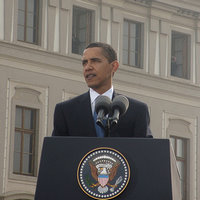While headlines focus increasingly on President Barack Obama's responses to the nuclear programs of North Korea, Iran, and Pakistan, the new administration has been quietly investing a substantial amount of diplomatic time and capital in a somewhat obscure meeting that nevertheless could have significant implications for Obama's nonproliferation agenda. The meeting, which will take place at the United Nations nearly a year from now, is the latest in a regularly scheduled series of gatherings of signatory states to review the nuclear Nonproliferation Treaty.
To a significant degree, the Obama administration's posture to date on a variety of nonproliferation issues has been calibrated to position the United States to gain desired concessions at the upcoming review conference. Obama'sgroundbreaking speech in Prague in April pledging the United States to the goal of a world free of nuclear weapons, his negotiations with Russia over further cuts in strategic nuclear arms, his support for a controversial nuclear test ban treaty and nuclear fuel bank, and his language and rhetoric on "rogue states" like North Korea and Iran can all be seen in this context. Administration officials are eager to avoid a repeat of the last such conference in 2005, when the Bush administration won little backing for its nonproliferation efforts, largely due to its skepticism regarding several arms control agreements and its repudiation of others.
Nonetheless, it is not clear that Obama's new approach will yield markedly better results. Many developing countries are in no mood to grant the new nonproliferation concessions sought by Washington, such as tightened rules on access to sensitive nuclear technologies, tougher inspection rules, or limits on withdrawing from the treaty. They remain angered by the Clinton and Bush administrations' failure to move forward on many disarmament commitments the U.S. pledged at the 1995 and 2000 conferences, as well as by explicit backtracking on some of them. Before these countries even consider further concessions, they want the United States to make good on its earlier commitments. Moreover, Obama is confronted with considerable skepticism in Washington about his strategy, and particularly how helpful it will be in dealing with what the United States views as the most urgent threats: North Korea and Iran's nuclear programs and the threat of nuclear terrorism.

